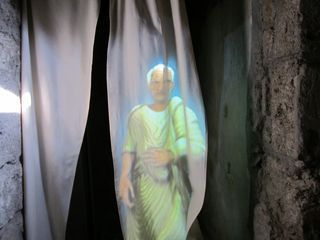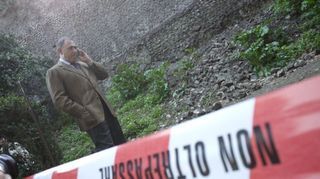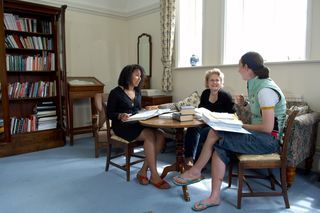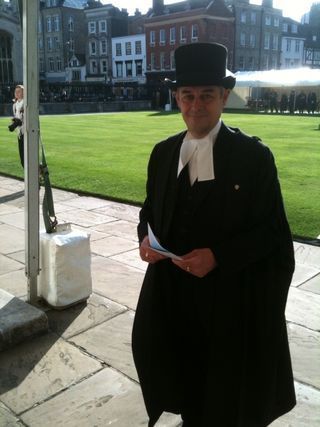Mary Beard's Blog, page 61
November 8, 2011
What makes UK Borders safe?
We still don't know for sure exactly who (Theresa May? Brodie Clark?) authorised what discretionary relaxation in which of the immigration procedures at UK Borders, and with what effect, and applying to whom. But the tub thumping of the likes of Yvette Cooper -- with the scarcely veiled implication that every terrorist, or at least illegal work-seeker, in the world could have used the opportunity to walk into the country unchallenged -- is certainly premature, if not ludicrous. (If we didn't know about the changes, then presumably those undesirable foreigners didn't either.)
But the bigger question is how, in practice, do we make the country's borders as safe as we want them to be. That may not in all circumstances be by fulfilling to the letter the computer checks on each person -- as are usually required. Whatever the faulty procedures, it could have been a good judgement call (on the part of May, I find myself surprised to say, or Clark) to be a bit more selective, and to use some sensible discretion.
Let's remember, for a start, that in the Schengen Area of Europe largely doesn't require that people show passports to cross the borders of individual countries. The Schengen Area doesn't only include EU countries, but Iceland and Norway too among others. So relaxing some checks on some people from there, especially young children travelling with their families, is hardly a remarkable step to take, especially when you have an arrivals hall heaving with cross travellers.
I haven't yet seen any clear explanation of "travellers from the EU" that May readily concedes she had had in mind for relaxation...does it mean the EU in the literal, narrow sense, or does it mean the EU AND the other group of countries from the EEA and Schengen, that now walk through the "Europe" line at our airports? I hope it means the latter -- and that we are not all getting our knickers in a twist about some three year olds from Iceland.
But let's suppose that what we are worried about are the "REAL" foreigners... the Americans, Australians, Egyptians and Somalians, etc etc. who might have been let in with inadequate checks.
Some really damaging stuff may be about to come out, but I haven't seen anything yet that suggests any serious dereliction of duty happened.
Just think of a packed arrivals hall, where tired passengers are queuing for 2 or 3 hours, sometimes more. I've been in a few of these recently and it is mayhem. People are worried abut missing onward flights and trying to jump the queue, and pleading with the officials to take them first. The elderly are barely able to go on standing (ever thought of a chair or two in an arrivals hall?), and young children are completely losing it and screaming lustily -- all over the place. We've heard this morning that things in the summer can get so bad in the UK that the police have to be brought in.
Now, presumably, one thing that makes our borders safe is that the immigration staff can concentrate on their jobs. I don't know what it that has to be checked between the computer chip and the person/paper passport -- but I am sure that it can't be easy to do that conscientiously when you are working in the middle of pandemonium. It seems to me to be highly likely that not biometrically checking (say) New Zealand children travelling with Mum and Dad helps, rather than hinders, the process overall. And maybe, experienced immigration officers can recognise some other groups which can be safely allowed in without all the computer checks, while spending the proper time on the others.
One thing is for sure, a riot in the hall does not lead to safe immigration procedures.
So short term, what was done may well have been sensible. Let's wait and find out more.
In the long term, we need to think a bit harder. Perhaps it woud be a good idea to join Schengen; we're always told that the fact that we have no land borders makes that inappropriate -- but Iceland seems to be managing.
And I would like to know more about how effective the computer technology really is. Each time I go to the USA and have my prints taken, my iris photographed, my passport swiped.. and I say, in response, to the routine question "I am here to give a lecture at the University of....".. I wonder how border safety is being enhanced.
Perhaps universal biometric checks aren't the best answer.
November 5, 2011
Gaddafi, King Idris and a Point of View
I have started a four week stint on Radio 4's A Point of View (this is the programme that I always thought was the one that rescued the poor listeners from the rigours of the Church Service on a Sunday morning -- but discovered that it goes out first after Any Questions on a Friday evening).
It is (so far) fun, but quite a lot of work -- first think of topical subject, a current beef to get off your chest, then cast it into an elegant 10 minutes worth of talk. Then go to London to record it.
My first choice was to look at tyrants ancient and modern, with an eye to arguing that the stereotypes of tyrannical behaviour prevent us looking more carefully at the different patterns of 'tyranny' .. and prevent us understanding why people might have supported these 'tyrants' in the first place. Maybe, even some of the worst monsters, are good in parts. You can read (and comment on) my text as broadcast here.
Anyway, it WAS a lot of prep; but even so I didn't do quite enough. When I went first to read it through to the mike, it was about 90 seconds too long. I know, I know: what would I have said to a graduate student who went to do a seminar and hadn't read the paper out to check the length it came out at...? Still, I hadn't. I'd relied on it being on roughly the right number of words.
So some last minute cutting had to be done. Some of this could be done by the usual sort of trimming: take out the repetitions, the redundant adverbs, superfluous asides. It made it (as it always done) a lot better; but you get rid of 90 seconds that way.
So one example had to go. And it was poor old King Idris. I had wanted to remind people that when Gaddafi came to power in 1969, he and his friends had been warmly welcomed by the international community. It was a coup waiting to happen (reports disagreed about whether there were no casualties, or just one), and the elderly King Idris was not only past it, he was at least passively corrupt, probably the pawn of a load of actively corrupt advisers, he tended to bang up or deport his opponents and was known to let his forces open fire on inconvenient student demonstrators.
He was actually on a medical holiday in Turkey when the coup happened, and I found some great (and, of course, possibly unreliable) newspaper accounts from the time. Some reports claimed that he had 60 million dollars worth of cash and stuff in the hotel safe and that -- appropriately enough -- Queen Fatima had been informed of the coup 'while out shopping'.
It's a nice reminder that for all the joy that now greets the National Transitional Council, the proof of the pudding comes later.
(Talking of pudding, the son has been trying his hand at restaurant criticism in New York: first two (ancient themed) articles here and here)
November 1, 2011
Can't tell a shop by its front
A few weeks ago I spent some time in a modern Pompeian bakery, Esposito's, learning about modern bread making techniques (the reasons for acquiring this skill will be revealed in due course).
[image error]It was, in all kinds of ways, fascinating -- from the different kinds of grain you would use for different sorts of bread, to the techniques of kneading ... to the interior decor of the bakery (complete with its holy pictures etc ).
We all had a great time. I was a pretty slow pupil, but my teacher -- the excellent  Carmine of the bakery -- gave me a bread shaped heart at the end of my lesson. So I felt flattered and rewarded (he must have been half my age.. ). And we had a great pizza and fizzy South Italian red wine at the end, to celebrate my (non-)learning of the bread-making techniques.
Carmine of the bakery -- gave me a bread shaped heart at the end of my lesson. So I felt flattered and rewarded (he must have been half my age.. ). And we had a great pizza and fizzy South Italian red wine at the end, to celebrate my (non-)learning of the bread-making techniques.
 But the interesting point (for me) is that, if it hadn't been set up, I wouldn't have gone into this bakery -- not even to buy a panino. The hoardings made it look quite awful... Big Mac on the Bay of Naples.
But the interesting point (for me) is that, if it hadn't been set up, I wouldn't have gone into this bakery -- not even to buy a panino. The hoardings made it look quite awful... Big Mac on the Bay of Naples.
How wrong can you get?
The bread at the Esposito bakery was superb (go buy some if you are ever in new Pompeii).
I would have been very put off going in there if I didnt know it... just from the outside (as you see at the top of this post). This shop front is pure, expensive, and vulgar South Italy; if I hadn't known about its great bread, it would really have been a turn off (it's the photos of the stuff they sell which just looks like all those awful Mediterranean tourist restaurants with their ghastly pics of the food -- for a rip off; not just Big Mac but worse).
I then of course castigated myself for my austere Britishness.
But, more than that, it made me think of all those other shops that I wouldn't go into, if I didnt know what lay within. Maybe we could think about the shops that hide their wonders.. suggestions please??
I have discovered a great shop in Boston Lincs..where they have splendid American macs you can't get elsewhere in the UK (doesnt look all that exciting from the outside.. but go in and wow); and then there was that shoe shop in Elgin where I got my great red German shoes (Andrew Begg).
More suggestions welcome -- great shops with unlikely or off-putting fronts.
October 28, 2011
Who gives a stuff about the Act of Settlement?
I have to confess that I have always thought it was to the great good fortune of the female members of the royal family that they didn't have to face the awful prospect of the throne, unless they were unusually deficient in the brother-department. Just occasionally discrimination can work, inadvertently, to our favour.
For me, it's rather like not being able to go to Mount Athos. Of course, I tend to protest publicly that it is 'men-only', but secretly I feel a twinge of relief that I dont have to go there, or have a view on the place, or join in those dreary conversations about old Father Demetrios... and so forth.
But since getting called twice by radio journalists in the last 24 hours to say something changing the Act of Settlement etc, and about girls getting an equal chance to get to be monarch as men, I've found I have rather stronger views.
For a start, what IS the point with tinkering with the monarchy -- as if a tiny bit of political correctness could bring it up to date? You don't make a medieval/Victorian institution 'fair' by rearranging the deck chairs like this. The whole institution is unfair, like it or lump it. That I think was more or less Alexander Chancellor's view in the paper this morning. Scroll down to the bottom.
In fact, I suspect that in 200 hundred years time, we'll look back to this reform as the beginning of the end of the whole institution -- as its much more serious inequities, its mad fantasies, get seen in even more clear relief, once this little bit of discrimination is removed.
But more to the point, fretting about the monarchy is almost always a political displacement activity.
Just reflect on the hours of parliamentary time that are going to go down this particular drain, when our MPs might actually be devoting their time and attention to banks, jobs, universities or whatever.
And just reflect on the effort and interest, across the Commonwealth, that will be devoted to the possibility that Kate and Wills's baby Princess might succeed to the throne, when there are millions of women in those territories who are still waiting for a proper education, or a proper job . . . Priorities, priorities, priorities?
Anyway, when I ranted along these lines to the said journalists, I found that I didn't get invited to share these views with the listeners....! Funny that.
October 27, 2011
In Pompeii-land
A couple of months ago we had a "Pompeii-debate" in Cambridge, with Simon Jenkins and Caroline Lawrence making a bid (in subtly different ways) for a bit more "reconstruction" at Pompeii... some re-con furniture put back, more roofs remade, even a few actors dotted around the place impersonating the Roman inhabitants and engaging the visitors in casual, but informative, conversation about life in the ancient city. (You can read a version of Simon's line here.)
What I hadn't realised then was that something of this sort had already come to Pompeii -- or at least to the "House of Caius Julius Polybius".
This used to be one of my favourite places in the town. It gives you a great glimpse of the upper storey of a Roman house, it has some marvellous wall decoration in the rooms around the peristyle (where 12 skeletons were found, overwhelmed by the eruption, as well as a considerable quantity of "treasure"), a 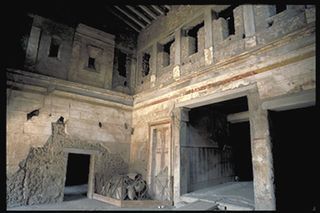 well-excavated garden (with trees of fig, lemon and fruit -- plus a ladder for gathering the crop), and some remarkable casts of the wooden furniture that once stood around the portico.
well-excavated garden (with trees of fig, lemon and fruit -- plus a ladder for gathering the crop), and some remarkable casts of the wooden furniture that once stood around the portico.
But some time in the last year or so, things have changed. For those visitors who pay extra for a tour that includes this house (which is normally closed to the public), Caius Julius Polybius himself now awaits to greet them. Or to be more exact, an image of Polybius (that's him above) is projected onto a scrappy curtain, and his voice booms over a tannoy, to welcome you -- accompanied by music, some odd bits of Latin, plus the sounds of dripping water (a kind of Roman sound and lightshow).
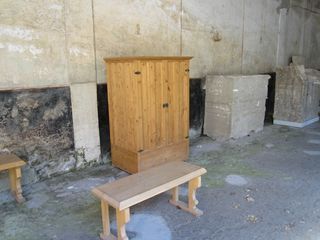
And that's not all. When you get to the peristyle, you find that just next to the relatively well preserved furniture that is still in situ, some modern look-alikes have been installed -- probably expensively-made  replicas, but at a casual glance they appear to have come from the local Ikea. Move on the dining room and -- just in case you missed the point about what it was used for -- there some Ikea couches and tables (and not in this case, I think, a very accurate version of what you would once have found). Meanwhile, in the pretence that it is all accessible to the disabled (just try Pompeii in a wheel chair!) a decidedly ugly metal entrance ramp has been
replicas, but at a casual glance they appear to have come from the local Ikea. Move on the dining room and -- just in case you missed the point about what it was used for -- there some Ikea couches and tables (and not in this case, I think, a very accurate version of what you would once have found). Meanwhile, in the pretence that it is all accessible to the disabled (just try Pompeii in a wheel chair!) a decidedly ugly metal entrance ramp has been  installed up to the front door, and all over the first hallway (or atrium) of the house. It's a truly ghastly industrial intrusion into the Roman scene.
installed up to the front door, and all over the first hallway (or atrium) of the house. It's a truly ghastly industrial intrusion into the Roman scene.
This is definitely a very poor advert for reconstruction. Simon and Caroline would, I suspect, argue that you can't judge the whole principle by a bosh-shot like this. True enough. But I couldnt help wondering who on earth wasted money on this rubbish -- when the real antiquities of the site could really do with the cash to provide them with a little more care and attention. Even just a few brooms to brush the dust and grime away would enhance the visitor experience more than a Disneyland Caius Julius Polybius,
October 22, 2011
Has another Pompeii wall collapsed?
The short answer is 'no'.
By chance I am on the site of Pompeii for the weekend. It is now swarming with more journalists than tourists, and all (it seems) with a determination to hype another collapse, another Pompeian disaster. That is to say, they are here with a determined misunderstanding of what has just happened -- or with a drive to use any damage to the site as a stick with which to beat Berlusconi.
Actually, I am usually quite happy to beat Berlusconi, but the fact is that this latest melodrama only serves to make the job much more difficult for those in the archaeological services here, who are doing their level best to keep the place up and running. (This weekend curators and other staff have been fielding tv crews, not getting on with the real job.)
So far as I can tell, what happened is this. There was an absolute downpour last night, in the course of which some stones were dislodged from a relatively fragile (and not very well built) stretch of wall near the Nola gate. A custode entered this damage rather loosely in the incident book -- and (we can only speculate how and why) that report got to the press, and it soon became a new "wall collapse". The carabinieri arrived and everything in the area (including, let me confess, where I want to go) was shut off.
I've had a look around so far as I can, and asked a good few questions ... and I don't think that it was any such thing as a 'collapse'. Sure, some blocks were shifted in a torrential storm; but it really wasn't the destruction of a priceless masterpiece.
Who'd be a curator at Pompeii, I wonder.
October 19, 2011
First year Ancient History at Newnham. What do we do?
Every year one of my favourite bits of teaching is with my Newnham first year students (technically, I mean, Part 1A -- because a few of them have already done our Prelim course, designed for those without A level Latin, or equivalent, and so are in their second year at Cambridge). First-year teaching is fun (and hard) because you are trying to educate (in the technical sense.. ie not cram) a highly intelligent group of students, but they are being asked to make a very quick transition between school and university. To put it crudely, and a bit unfairly to A levels, they have quickly to become independent learners (with support and guidance); they have to discover what it is to explore a historical topic without knowing that there is a checklist of criteria whose boxes they have to tick in order to get a first, 2.1 or whatever; and they have to discover that intellectual inquiry is open-ended, exciting, difficult if you do it well, and that it MATTERS.
So what do I get them to do for their first piece of supervision (ie tutorial) work?
Well, 15 years ago, I used just to set a 'straight' essay... something like a "How useful is the evidence of Lysias 1 for the position of women in Classical Athens?', appending a bibliography which gave them (albeit indirectly) the answer. There were, in fact, some good lessons here. Lysias 1 (on the murder of Erastosthenes) was a first year set text, and they learned a lot about it and about the position of women in classical Athens. Not bad.
But they didn't learn much about exploring for themselves (they followed the bibliography I had given, rather over dutifully, despite exhortations to follow up other stuff they came across) and they didnt learn much about the overall picture. Ask them about Lysias and they would know a huge amount. Ask them about Solon and they were likely to look blank. OK, they had lectures which covered Solon, but (so far as I have observed) attending lectures conscientiously never quite hits the spot in the brain that writing an essay (vel sim) does.
So I starting trying something rather different for their first piece of univeristy work in ancient history. For a few years, I would ask them to go away and write me a history of the ancient world (8th century BC to fifth century AD) in 1500 words. This was great for a bit. They learned quite a lot, and produced mostly rather conservative stuff. But you could really open it up in the supervision -- pointing out that half of them had not mentioned a single woman or slave, or that their view of 'the ancient world' had been entirely Greco Roman.. etc etc
The trouble was that this assignment got to be part of the student mythology, so by the time the new first years arrived in my room, the second years had already tipped them off about what I was likely to ask. So this year I rang the changes, I gave them all a short essay to write on why the 'Old Oligarch' (another set text) might be the best guide to fifth century Athenian democracy that we have (they had a decent bibliography and I gave them a 30 minute supervision, one to one, on what they each had written). But for our communal class, all together, I set a rather different exercise.
I gave them two inscriptions from the Athenian fifth century, in Greek (and with a translation), and I asked them to come back prepared to say what these texts were and why they were interesting. I gave them no bibliography (though if they looked carefully at the introduction to the translation they would have seen a few hints). I said I didn't mind how they found out about them.. asking mates, googling, discussing together, reference books .. but I wasn't going to help. (The inscriptions, by the way, were the records of the property of the Hermokopidae ('mutilators of the herms') auctioned after their trial, IG I/3, 426 and 30) and the Athenian regulations for Chalcis, Meiggs/Lewis 52.)
To be honest, they looked a bit horrified when I explained this task (yes, you did!) . Most of them had never seen a Greek inscription before, didn't even know they existed, I guess. And, in fact, when I explained to my own old Director of Studies (Joyce Reynolds.. gradually on the mend, by the way, after her hospital stay) what I had set for the first years, she said that she thought it was rather a 'stiff' exercise. (Frankly, I thought this was a bit rich. Back in the mid 1970s we had learned amounts from her by being given much more impossible tasks.)
Anyway a week later, they came to their joint supervision, brilliantly prepared to talk about these texts. They had got together, they had shared their knowledge, they had googled and explored the library.. and they could really talk about what these utterly unfamiliar inscriptions had to say. And they had learned a little bit about what research was really like, and they hadn't just followed the bibliography (because they didnt have one!). I was delighted, and they were really launched I think.
So next year, I shall do something similar -- though I shall have to shake up the texts, otherwise these kids will just pass on their expertise to the new girls next year. "Ah yes, we did that.. what you need to say is..."
October 16, 2011
Lord Sainsbury wins the chancellorship -- phew!
I am celebrating. It was announced a few hours ago that David Sainsbury had been elected Cambridge Chancellor on the first round of voting, scoring an absolute majority over all the other candidates: Sainsbury 2893, Blessed 1389, Mansfield 964, Arain 312. (That's from the BBC website, the University hasn't actually managed to get the result up on its own... festina lente is our motto.)
The truth is that I was beginning to get a bit worried that Brian Blessed would carry the day, and was wondering how I was not going to appear curmudgeonly -- welcome the democratic decision and make the best of it.
I myself went off to vote on Friday morning, thinking that I would find the whole process relatively queue-free at that point. I had a lecture to give at 11.00, and biked up to the Senate House at about 10.25 to find already a substantial line (and David Howarth and Edna Murphy -- who had already voted (trust an ex-MP) -- warning me that there would be a 20 minute wait.
I put on my gown and got dutifully in my place, next to a chatty, elderly lady who had a Cambridge MA and so could vote in this election (as a Member of Senate). She complained that it was a bit awkward having to turn up in person to vote. 'Well,' I replied, 'it shows that you are really interested and concerned'. 'OK,' she came back,' but what if I lived in Mongolia?' 'I would want to make it difficult for you,' I said slightly grumpily. 'The chances are you would know very little about the university -- I wouldn't want you to be casting a vote for my chancellor. Voting in person has a point."
'Were you this awkward when you were a child?', she asked. in what I think was a semi-friendly way. And it got more friendly when we discovered that we were both about to cast our votes for Sainsbury.
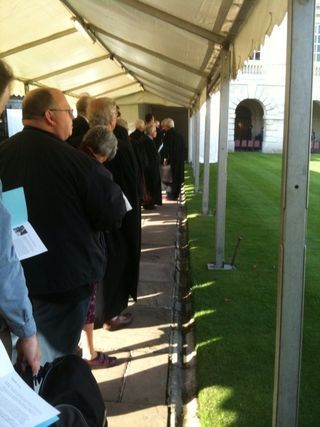
I have to say that the University (no doubt seeing a 'Development Opportunity') had organised things 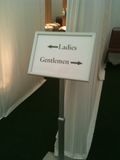 rather well: they had got loos laid on for the queue (which was policed as you see in traditional style); they gave out free university 'buttons'; they offered clear instructions about the Single Transferable Vote system; and when, with 10 minutes to go, I said I had a lecture to give at 11.00, they helped me get a bit ahead. (Thank you all)
rather well: they had got loos laid on for the queue (which was policed as you see in traditional style); they gave out free university 'buttons'; they offered clear instructions about the Single Transferable Vote system; and when, with 10 minutes to go, I said I had a lecture to give at 11.00, they helped me get a bit ahead. (Thank you all)
But it was hard not to think that Blessed was not creeping ahead. You only had to look at the tweets and the headlines in the local paper, telling us how someone was even flying in from the US to vote for him. In fact, I met one of my own ex-students in town who had showed up specially to vote for Blessed.
It was, of course, all a bit illusory -- because the majority of Blessed's supporters are much more the tweeting generation than me and my mates (most of whom, who had met him, had thought Sainsbury a very good thing -- whatever their initial doubts). The curious thing was that overall, despite the apparent traditionalism of the whole vote, this was much more a youthful election than ever before, certainly more youthful than the last real election in 1847.
The electoral body is the Senate, which is -- more or less -- all holders of Cambridge Masters degrees. Even 50 years ago that was largely ex-undergraduates, no longer resident in the city, who had received Cambridge their MA's two or three years after graduating (that is: not less than six years after the end of your first term of residence). There would then have been a small number of doctoral students eligible to vote, if they had graduated at Cambridge . . .but PhD students were not thick on the ground in the mid 20th century.
Now there are some 6000 graduate students in Cambridge, of whom perhaps half are studying for a PhD -- and many of those would have taken a Cambridge MPhil (or similar) in the run up to a PhD, and so be member of the Senate. Which is to say that the Senate is a very different body: not just the dons plus the, more or less interested, old members; but the dons, the more or less interested old members AND a couple of thousand graduate students (with enthusiasm and twitter at their disposal). This is probably a good thing, but it makes the election and the mechanisms or persuasion and canvassing rather different from the old days.
Anyway, the election went as I had hoped and prayed. And now I am optimistic that our new Chancellor will do us some great good turns: that is, not interfering (as he has said he won't) with the policy making, and maybe helping not only to open up a space in which we can talk to the outside world more effectively, but also to open up a space in which we talk to each other (from graduate students to the Mansfield backers.. who in my view got the role of the Chancellor quite wrong, but have got a few other things right).
In my heart I am having a party. But only in my heart. I'm actually writing next week's lectures.
October 13, 2011
Is Cold Comfort Farm a 'good read'
Sometimes it is a bad idea to go back to books you thought you once enjoyed; but on this occasion I didnt have much choice. I hadn't picked up Stella Gibbons's Cold Comfort Farm for decades, but had vaguely fond memories on "something nasty in the woodshed" (a phrase she coined, as a mysterious episode in the past history of Aunt Ada Doom). But one of my gigs at the Cheltenham Literature Festival on Sunday was to record an episode of Radio 4's A Good Read.
If you have never listened to this programme, the idea is simple: two guests plus the presenter each choose a favourite book, and then discuss each one together. I was on with the excellent Bidisha, who had opted for The Handmaid's Tale (this was good for me, as I long felt guilty for not having read it, and here was the perfect excuse). I myself chose The Odyssey (which really is a good read, in a way The Iliad isn't). The presenter, Harriet Gilbert, had chosen Cold Comfort Farm ("'Very probably the funniest book ever written' Sunday Times" -- as was blazoned, promisingly, on the front cover).
Well, it didn't do it for me.
The story is a simple one. Flora Poste, left orphaned, goes to lodge with her relatives at a Sussex farm (Cold Comfort) -- who appear to live in a wild version of the British Rural Novel, a mixture of Thomas Hardy, Emily Bronte and Mary Webb; it's full of filth, unprotected sex and parodically rural names (Seth and Reuben etc, as well as old Aunt Ada). Flora sets herself to cleaning this place up, marrying the residents off suitably, getting the truly mad into Nursing homes, before finally getting married herself (not to a resident of Cold Comfort, needless to say).
Sure, there are some funny bits. Gibbons has some great literary parodies, some wonderfully invented rural language (you dont wash the dishes here, you 'cletter' them with a bunch of twigs), and an array of marvellous names. The farm's cows are delightfully graced with the names 'Feckless', 'Graceless', 'Aimless' and 'Pointless' (rather like a squadron of aircraft carriers called "Wimpish', "Feeble' and 'Lily-livered').
But as I read on, I felt that more and more of it was 'pointlessly' puzzling, and actually not entirely nice. For a start I couldn't work out why the book was set in the future. It was written in the early 1930s, but these people talk to each other on video phones, and whizz off to Paris on airplanes that land just near the farm. What on earth did Gibbons mean by that (Bidisha thought it was another delightful aspect of the whimsy . . . )?
But, by the end of the book, when the farmers had been well and truly cleaned up, and Flora had gone off to a triumphant (Jane Austen style) marriage, I thought we had been reading a rather controlling victory of modern order, cleanliness, contraception and medicine -- over these messy, different, rural types. Harriet and Bidisha argued that the joke of the book was really on everyone, Flora included. But so far as I could see, Flora got her way on everything -- at which we, the readers, were meant to be delighted, and applaud her future nuptials.
I found myself screaming for the rights of these poor country folk NOT to fall into the hands of people like Flora, to continue with their stupid cows, their indiscriminate sexual activities, and their mad aunties in the attic. Give me back my Mary Webb, I found myself shouting. (You can listen here for a few days.)
I certainly didn't please everyone! There were a couple of good humoured, objecting tweets, and just after the programme was first broadcast, I got a very cross email from a lady in Oxford. It was headed "You" in the subject line (always ominous), and read:
"I find your puplic persona and general 'jolly' approach irrritating. I now avoid your programmes."
I wrote back to her to ask her to fill me in a bit (I mean I find quite a lot of people on the radio irritating... but I dont email them to tell them). But I got no reply. Rather self-protectingly, I guess, and with no other evidence to go on, I have decided that she must be a real Cold Comfort Farm fan -- or else someone who really hates The Odyssey (not just me!).
October 10, 2011
The Chancellor race: on the home straight
We are voting for the new Chancellor on Friday and Saturday. The candidates, as some readers will know already, are (in alphabetical order): Abdul Arain (the grocer from Mill Road), Brian Blessed (actor and national treasure), Michael Mansfield (QC) and David Sainsbury (mega-grocer and ex-Labour science minister).
A few months ago, at the start of the race, I posted that I was minded, on this occasion for once, to vote for the establishment candidate (that's Sainsbury) -- albeit with not huge enthusiasm. Since then I had a bit of a wobble and thought I might cast my vote for Mansfield. In the last week, though, as I'll explain, I have come back to Sainsbury -- but now with pretty firm confidence, commitment and even a touch of enthusiasm.
The underlying question seems to me to be what you think the Chancellor of the University is FOR.
Now let me say that almost all my election research has been done from written sources. I haven't 'interviewed' the candidates (though I have recently met Sainsbury briefly)...
On that basis I have easily ruled out (as I already had a few weeks ago) Abdul Arain and Brian Blessed. I think that, by getting nominated, Arain has staged a great publicity coup against the big supermarket barons. And that far, I'm right behind him -- but no further; I'm certainly not behind him right up to the chancellorship.
The same but different for Brian Blessed. Again, he's great at what he does (acting -- for those of us who remember Z Cars and I, Claudius). But he is the students' favourite, because they imagine that the Chancellor of Cambridge is like a Scottish University Rector, a sort of student mascot. Now maybe they have a point and Cambridge should invent some such mascot position; and if we did, Blessed would be a very good person to fill it... but he isn't a chancellor as I see it. (His supporters' campaign case is here)
Of course, having had a royal filling the post for the last 35 years (and so making it largely ceremonial), it's not entirely clear what the job is, or how far those of us who work in the university share our expectations of what this man (not a woman in sight here, note) will, or should, do for us. And that, I suppose, is where my wobble came in.
When I read Mansfield's "manifesto" for the post, it was full of an awful lot I agreed with -- deploring cuts in education funding, and the effect of very high fees on poorer students, inter alia. But then I thought: 'hang on'.
It's not really a question of Mansfield not quite being the knight in shining armour that he is cracked up to be (true, he has some landmark civil rights cases under his belt; but remember that he also represented Al Fayed, 'in his pursuit of the truth surrounding the death of his son, Dodi, and Princess Diana', as his own website tactfully puts it). The bottom line is that -- however much I might agree with it -- we dont want a Chancellor with a 'policy' for the university. We already have 'policy-makers' at Cambridge (the Vice Chancellor, the democratic institutions of the place, and us); the last thing we need is an 'official' elected by all the alumni of the university (or, to be precise, those who bother/can afford/live close enough to turn up at the senate house) who thinks he should be influencing our educational policy. (Sorry alums, but that's far too much power to you as a body).
So what should the Chancellor be doing? Probably, if not a royal, rather more than Prince Philip could do, in his position. But it should be an enabling role, not a politically directive one. I am looking for someone who might help in opening up the space for us to discuss widely the role of the university and educational priorities with government, funding bodies, and the media -- and who might help us get across our aims and policies better. Not someone who wants to tell us what those policies should be. (Just fast forward a few years to a dystopian future when some single-minded alums decide to put loads of money and influence behind a candidate who wants to raise fees to £30k a year and abolish bursaries... then the chickens really would have come home to roost.)
That is where Sainsbury's brief nomination statement has got it much righter. He sees the duty of the chancellor as championing the university, not trying to guide its policy.
As it happens, when I talked to him, I found his views on many things (from access to RAE/REF) much much closer to my own than I had expected. And that is, if I'm honest, what adds a little enthusiasm to my vote. But it's not what actually commits me to voting for the guy in the first place. The key thing, for me, is that he correctly sees what the 'job' of the chancellor is.
Mary Beard's Blog
- Mary Beard's profile
- 4110 followers





